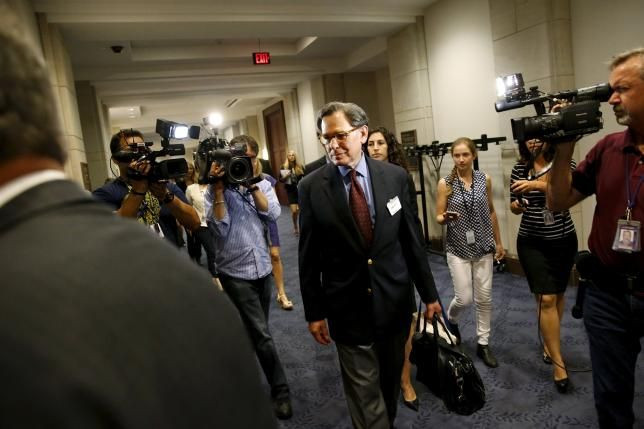Clinton Ally Praised Her Libya 'Success' Year Before Benghazi Attacks: Emails

An unofficial adviser to Hillary Clinton when she was U.S. Secretary of State told her during the 2011 rebellion that ousted Libyan leader Muammar Gaddafi that history had "vindicated" her and the "successful strategy" of the United States, emails released on Monday showed.
Sidney Blumenthal, a longtime Clinton ally and friend, heaped praise on her in the emails while making snide remarks about lower-level White House officials whom Blumenthal apparently feared would soft pedal what he considered to be a moment of U.S. triumph during the NATO-led intervention.
The emails were released by the House of Representatives' Select Committee on Benghazi, which is investigating the September 11, 2012 attacks on U.S. facilities in Benghazi in which Ambassador Chris Stevens and three other Americans were killed.
Clinton is now a candidate for the Democratic nomination to run for president in the November 2016 election, and Democrats say Republicans leading the Benghazi probe are politically motivated to scrutinize her correspondence.
Blumenthal handed over some additional correspondence before testifying behind closed doors to the panel last week. But he told reporters that he had "shed no light" on the attacks during his testimony because he had no first hand knowledge of them.
His emails show, however, that during the Libyan uprising, Blumenthal was showering Clinton with information, some of it passed on from a former U.S. intelligence official.
"First, brava! This is a historic moment and you will be credited for realizing it," Blumenthal wrote to Clinton on Aug. 22, 2011, at a time when Libyan rebels had surrounded Gaddafi's compound, without finding the dictator.
"This is a very big moment historically and for you. History will tell your part in it. You are vindicated," Blumenthal wrote.
He said that whenever Gaddafi was removed - and he was - Clinton should be sure to emphasize the "successful strategy" of the United States.
"Be aware that some may attempt to justify the flamingly stupid 'leading from behind' phrase, junior types on the NSC (National Security Council) imagining their cleverness," Blumenthal wrote. He said Clinton should "refute this passive construction on U.S. policy" and not be "defensive."
The years following Gaddafi's downfall have been chaotic for Libya, which now has two rival governments battling for control and Islamic State militants seeking to take advantage of the security vacuum.
In releasing the emails on Monday, the House panel's chairman Republican Representative Trey Gowdy of South Carolina said that Blumenthal was not the author of some correspondence with Clinton. Some of Blumenthal's emails contained intelligence sourced to a former CIA official, Tyler Drumheller.
Gowdy refused Democrats' requests to also make public the transcript of Blumenthal's deposition, which Democrats say would show Republicans on the panel asked Blumenthal far more questions about politics than Benghazi.
Gowdy said Monday that he found it "odd" that Blumenthal was sending the Secretary of State unvetted intelligence memos when the State Department had its own intelligence bureau, not to mention the CIA.
Gowdy also said Blumenthal's emails should have already been part of the public record, because the State Department should have included them when it released Clinton's records on Libya to the panel. State Department spokesman John Kirby said the department is reviewing the emails that were posted online Monday to determine whether there were any that it had not received from Clinton when she sent the department work-related emails from her private email server.
© Copyright IBTimes 2024. All rights reserved.





















